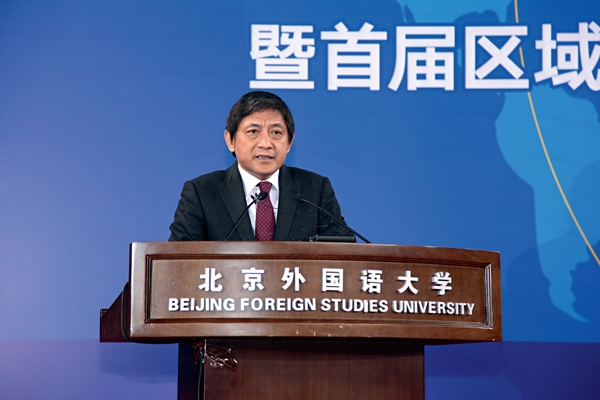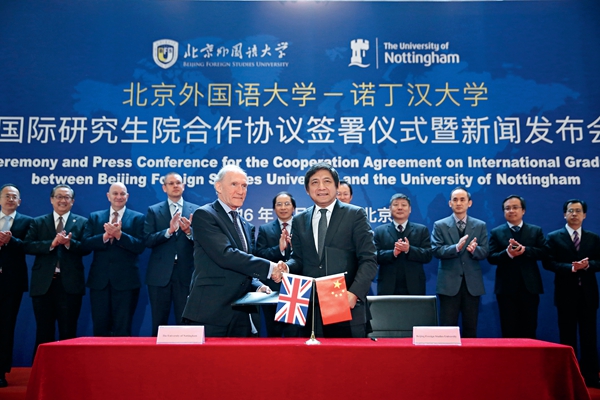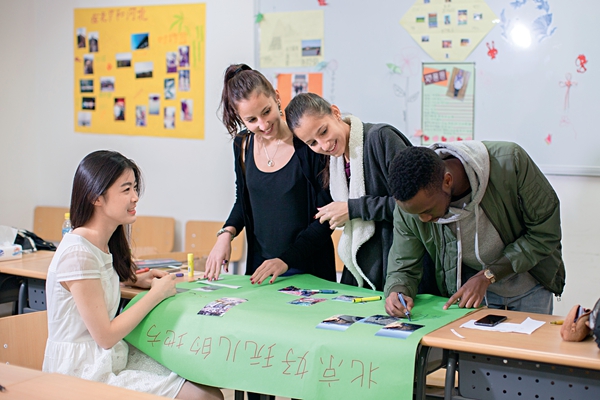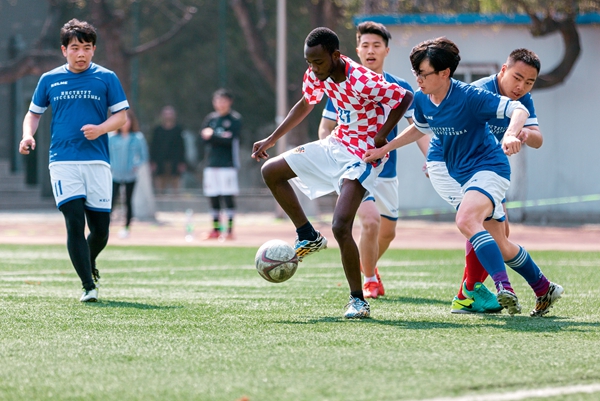By staff reporter ZHANG HUI
By staff reporter ZHANG HUI
THIS year, the term “new four inventions” has created a craze in China’s media world with a spate of related stories topping the headlines of countless media outlets. The term’s creator is Beijing Foreign Studies University (BFSU).
BFSU’s Silk Road Research Institute carried out a survey among its international students from 20 countries along the Silk Road Economic Belt and 21st Century Maritime Silk Road, asking them to name items or services in China that they most aspired to bring to their home countries. High-speed railways, mobile payments, bike sharing, and online shopping led the list.

Over the past several years, BFSU, based on its expertise in foreign language teaching, has set up a range of schools including the Silk Road Research Institute, Institute for Global History, Academy of Regional and Global Governance, and College of International Organizations. This semester, the university offered new courses in six Asian and African languages including Georgian, Afrikaans, Berber, Comorian, Punjabi, and Baluchi, which all appear for the first time in a Chinese classroom.
In addition, BFSU runs 22 Confucius institutes worldwide with the number of registered students soaring. To learn more about these measures and situations, China Today interviewed BFSU President Peng Long.
Promoting Diversified Civilizations
China Today: BFSU has added many new languages to its curriculum. Can you tell us the university’s motivation for the move? And how many language courses do you provide? What’s BFSU’s position in the country and the world in terms of foreign language teaching?
Peng Long: BFSU has long cherished a good tradition of serving the country’s strategies. Since the beginning of the Belt and Road Initiative, BFSU has sought to contribute to the initiative. Those new language courses will help build a bridge for people-to-people exchanges among countries along the routes, and play a significant role in deepening research in the related regions.

In addition, as Chinese culture spreads to the outside world and more Chinese companies go abroad, people-to-people exchanges between China and other countries have become more frequent. As such, we believe it’s time for BFSU to cover all languages used in countries with diplomatic relations with China. BFSU now offers courses of languages used in all EU and ASEAN countries, and is now preparing to cover all languages used in countries along the Belt and Road.
One important mission for BFSU is to contribute to diversity of world civilizations. As of now, we have opened courses of 84 languages, the largest number for any Chinese university. Today, language study universities in the developed world provide courses of a large amount of languages. For example, Harvard in the United States has courses of more than 90 languages, and Lomonosov Moscow State University teaches 120-plus languages. So, our plan is to cover all official languages used in countries that have established diplomatic relations with China by 2020. At that point in time, our university will be at the same level as those in the developed world.
I think to cultivate people adept at less common languages is to ride the globalization trend, and to respect different civilizations. Now as the world is becoming increasingly integrated, we can’t marginalize or even ignore some cultures, simply guided by some indexes about national population, economic development, and politics. It’s necessary to break the monopoly of the dominant countries over people’s cognition of the world, and incorporate courses into our curriculum about the culture, history, and economy of countries whose languages are less used globally, thus promoting diversity and pluralism of the world.
China Today: BFSU’s Silk Road Research Institute was founded in January 2015 as an important think tank about the Belt and Road Initiative. Would you give a brief on its work? What’s its role in promoting China’s people-to-people exchanges with countries along the routes?
Peng Long: The Silk Road Research Institute is mainly engaged in talent cultivation, academic research, social service, and international exchanges to serve the Belt and Road Initiative. I think BFSU’s advantage lies in its capacity in foreign language teaching, which enables us to carry out research on the history, culture, and other aspects of those countries along the routes with the first hand information and documents.
The institute has organized multiple think tank exchange events and training programs including the advanced political and economic training session for officials from Sri Lanka in December 2015, the advanced training program on sustainable development for officials and media people from Thailand in 2016, the 2016 “Friends on the Silk Road” Cambodian social governance seminar, and the new media training program for Mongolian officials and media workers in 2016.

Meanwhile, the institute has also carried out surveys to learn more about people in countries along the Belt and Road regarding their knowledge and understanding of China’s development, and their needs for self-development, which provides advisable guidance for later people-to-people exchanges along the Belt and Road.
Integrating Language Teaching with Humanities Subjects
China Today: What prompted BFSU to establish the Institute for Global History in December 2014? What are the major research results of the institute?
Peng Long: BFSU started history courses in the 1960s, covering world history, Chinese history, and the history of some other individual countries. But we had not formed a complete discipline system on history. It has been advocated for universities to improve their liberal education. I think the fundamental essence of liberal education lies in courses of literature, history, and philosophy. On top of that, we have also gradually noticed if a student aims high and wants to achieve something big in the future, his or her knowledge of history will be very important. So, based on these considerations, we decided to set up the institute.
Apart from organizing academic lectures, international conferences, and publishing periodicals and books in Chinese, English, and German, the institute is now preparing to build a database on global knowledge transfer and history of Chinese students studying abroad. It’s planned to complete a database by 2020 with basic information of around 10,000 Chinese students who had previously studied abroad, thus revealing the picture of knowledge transfer during the period between the 19th and 20th century.

China Today: What has the Academy of Regional and Global Governance done since its establishment in October 2016? What kind of foreign exchange activities has the academy rolled out to promote China’s new concepts, new thoughts, and new strategies on state governance and to contribute Chinese wisdom to global governance?
Peng Long: One of BFSU’s distinguishing features is the combination of language teaching with regional and country specific studies. We’re trying to shape a development model in which language teaching, humanities research and talent cultivation reinforce each other. Thus, upon graduation our students will not only be equipped with a high language ability but an academic capacity to carry out research on culture, history, and other aspects of a specific country. Integrating teaching, research, and think tank functions, the institute is devoted to serving China’s “go global” strategy, cultivating high-caliber talents, and advancing regional and global studies. As of now, BFSU has established 41 centers for studies on individual countries.
This institute provides service to Chinese enterprises going abroad. For example, we’ve signed strategic cooperation agreements with nine centrally administered state-owned enterprises like China National Machinery Import and Export Corporation and China Construction Bank, and some local companies like Liugong Group. When they run into difficulties abroad, they can resort to our centers for studies on individual countries for support.
In addition, research results of the institute have been used in building foreign exchange mechanisms like those between China and Germany, China and French, and China and Russia.
China Today: Why did BFSU set up the College of International Organizations in April 2017? What type of talents does BFSU aim to cultivate via the college?
Peng Long: With its rapid rise in the international community, China needs its voice to be heard by proactive participation in global governance. However, in some major international organizations, there are not many Chinese people holding high-ranking positions, which is disproportionate with China’s position in the world as a major country. So, we aim to train a group of students who will not only have a good knowledge of international rules and organizations, but be adept at foreign languages and cross-cultural communications.
In this college, students are required to master at least two foreign languages used in the UN, for example, English and French; besides, they also have to choose a major, like politics, economics, law, international communication, or history. Moreover, BFSU also makes efforts to establish essential cooperation relationships with some international organizations such as the EU and the UN, so as to provide our students opportunities to have an internship there and finally take a career path in an international organization.
China Today: With those new institutes established, what are the characteristics of BFSU’s subject setting?
Peng Long: We have been highlighting our advantage in foreign language teaching, strengthening our standing in disciplines such as foreign linguistics, foreign literature, translation, regional and individual country studies, comparative civilizations, and cross-cultural communication. On top of that, BFSU also makes efforts to enhance the integration of foreign language disciplines with other subjects of humanities and social sciences, in a bid to form a sound disciplinary ecology and sharpening the university’s core competitive edge.
I think a good university should be able to contribute its part to a country’s development and even that of the world civilization. BFSU should make contributions to the country in this critical development stage. We seek to improve students’ knowledge structure and make them acquire the quality and capability to better serve the country’s development and the progress of human society. Accordingly, we have gradually expanded the scope of our subjects and disciplines; as I mentioned before, we expanded the history discipline, and also added subjects on education and arts. Of course, we do not add subjects randomly, mostly those closely associated with foreign languages. In the future, we plan to add further subjects on psychology, sociology, and anthropology.
A Foreign Student-Friendly University
China Today: For foreigners eager to learn more about Chinese culture and master the language, what courses of BFSU are recommendable to them? How is BFSU doing in this field?
Peng Long: In the past, most foreign students came to our university to study Chinese language, history, and culture. However, things have changed a lot over the past several years. For example, in our International Business School, there are about 300 to 400 foreign students from 60-plus countries. They came to study China’s economic management. There are also nearly 100 foreign students in our School of International Relations and Diplomacy.
In particular, we find that lots of students from countries along the Road and Belt tend to select BFSU because our university has courses in their native languages, allowing them to study without a language barrier. We also encourage teachers to give lectures on China’s development in their native languages, which are very popular among foreign students.
I think these changes are closely associated with China’s development and the country’s rise on the international stage. Many students from countries along the Belt and Road see the growing importance of China’s relations with their countries, the primary reason for them to study in China. I believe they feel a sense of purpose, and will make great contributions to their countries’ relations with China in the future.
China Today: BFSU operates many Confucius institutes worldwide in partnership with local colleges. How are these institutes faring?
Peng Long: As a Chinese university running the biggest number of Confucius institutes, BFSU now runs 22 Confucius institutes in 17 countries across Europe, Asia, and America, partnering with local colleges. We tend to select the world’s top universities for partnership, in particular in Central and Eastern Europe and countries along the Belt and Road. In fact, those Confucius institutes we are running have promoted BFSU’s exchanges with our partner universities, and enhanced our language teaching capacity building and studies of individual countries.
The registered student number in these Confucius institutes has soared to 27,672 in 2016 from less than 2,000 in 2007. This steep growth owes much to China’s overall development and its contribution to the world’s development. Students mostly want to learn about the basic situation of our country and its culture. Of course, some students have shown special interest in specific aspects, like Chinese art, our legal system, and economic management. However, basically it’s their interest in Chinese history and culture that has prompted them to register in our courses.
The Arrival of a New Era
China Today: The 19th CPC National Congress captured worldwide attention. How did BFSU’s foreign teachers and students respond to the significant congress? How do they view China’s achievements over the past five years?
Peng Long: They showed different degrees of interest in the event. In general, foreign students and experts with higher academic degrees attached more importance to the congress. Many of them use the word “amazing” to describe China’s achievements over the past several years, which are embodied in landscapes of major metropolises, more convenient transportation, and convenience brought by technical innovations, like bike sharing, WeChat, and Alipay.
They have shown more concern to China’s policies and resolve on anti-corruption, coping with climate change, and development of renewable energy. Someone remarked that largely due to the CPC’s leadership, China has solved so many big problems. Sometimes they also lamented that due to some reasons, their own countries, under their unique political systems, could not have attained what China has achieved. They showed admiration towards China’s incredible progress. On the whole, I feel China’s bright development prospect has become much clearer to our international teachers and students.
China Today: How do you see the significance of the 19th CPC National Congress to BFSU’s teaching and research work?
Peng Long: As China enters a new era, it’s inevitable for the country to readjust its relationship with the world. With consideration to the overall situation in China and the world at large, the CPC has proposed a range of new thoughts, new strategies, and tasks, which is of great significance for China’s foreign language education.
In modern times, China’s foreign language education practitioners have spearheaded China’s endeavor to learn about the outside world. In the early years of the People’s Republic of China, they shouldered the historical mission of introducing the world to China. Today, a new task comes upon us to present China to the world. Therefore, through foreign language education, we’ll contribute Chinese wisdom and provide Chinese plans to the world in addressing issues faced by all humankind.